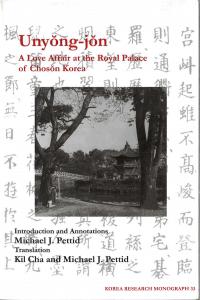Unyŏng-jŏn
Unyŏng-jŏn
Michael J. Pettid, intro. and annot., Kil Cha and Michael J. Pettid, trans.
This early seventeenth-century novel follows the winding path of a secret love affair and the difficulties the court lady and the poet-scholar encounter in attempting to realize their romantic dreams.
As a nonprofit academic press, we need your support to publish our books. Your gift can help us make more of our titles available as e-books. DONATE NOW
Title information
This early seventeenth-century novel follows the winding path of a secret love affair and the difficulties the court lady and the poet-scholar encounter in attempting to realize their romantic dreams. According to Pettid, "The novel holds all the elements needed for a truly captivating story: love, treachery, heartbreak, danger, and friendship." It is also an excellent character study of divergent personalities ranging from a rival to the throne to a lowly slave. Unyŏng-jŏn is especially noteworthy for its female narrative voice, which made the novel very popular among women of the time and has prompted many to ask whether the anonymous author was, in fact, a woman. Pettid addresses this question and others in his introduction and analysis that aid the modern English-speaking reader in understanding the work.
Michael J. Pettid, intro. and annot.
Michael J. Pettid is professor of Asian and Asian American studies at Binghamton University (SUNY).
Ph.D. University of Hawai'I, Manoa
Kil Cha and Michael J. Pettid, trans.
Kil Cha is a lecturer in Asian and Asian American studies at Binghamton University.
Unyŏng-jŏn (KRM 33)
Acknowledgments – vii
1. Introduction – 1
2. Historical Backdrop – 6
3. Unyŏng-jŏn: An Analysis of a Seventeenth-century Novel – 26
4. Chosŏn Society as Revealed in Unyŏng-jŏn – 57
5. Unyŏng-jŏn: The Translation – 64
Character Glossary – 113
Bibliography – 120
Index – 128
|
JOURNAL REVIEWS |
|
"One of the strongest points of Unyŏng-Jŏn is the precise and thorough translation that is achieved all while maintaining the natural flow of the original work....In fact, the high quality of the translation that is evident in Unyŏng-Jŏn is in many ways the result of...precise and meticulous annotations....[T]his work [Iis] accessible to those readers with an interest in the study of Korean literature as well as the more general reader." ~Lim Jeongjee, Ajou University, in Review of Korean Studies |

